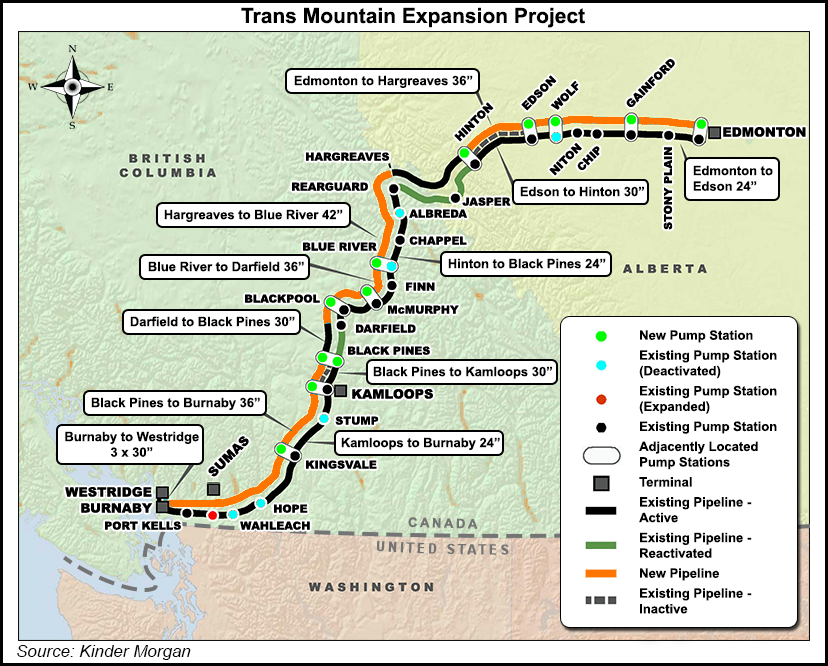Infrastructure | E&P | NGI All News Access | NGI The Weekly Gas Market Report
Kinder Morgan’s Canadian Unit Secures Backing for Trans Mountain Growth
Investors made a C$1.75 billion ($1.3 billion) bet that political protest against Kinder Morgan Inc.’s Western Canadian pipeline project would turn out to be bluster rather than power.

Amid a war of words among British Columbia (BC), Alberta and federal leaders, the market snapped up an initial public offering of Kinder Morgan Canada’s contested growth program, buying 102.9 million shares for C$17/share ($12.75).
The stock represents 30% ownership of a 590,000 b/d expansion, which nearly triples Trans Mountain Pipeline’s capacity to a Vancouver tanker dock from oil-rich Alberta’s capital, Edmonton, to 890,000 b/d for C$7.4 billion ($5.3 billion).
In BC, the New Democratic Party (NDP) and Green Party formed an alliance that confirmed Kinder Morgan’s description last week of the political climate as “not ideal.” The company acknowledged the risk by discounting the offering price from an initial target range of C$19-22 ($14.25-16.50).
The NDP and the Greens agreed to combine their winnings in the May 9 BC election into a 44-member majority in the 87-seat provincial legislature, to make the 43-seat Liberal minority government resign or face parliamentary defeat and another election.
The agreement commits the opposition parties to every action possible for a provincial government against the Trans Mountain project in the name of defending the west coast environment, curbing Alberta oilsands development and defending aboriginal rights.
The northern Alberta bitumen belt stands out as Canada’s biggest and fastest-growing consumer of natural gas — a distinction that makes thermal oil extraction a prime target for opponents of carbon emissions blamed for global climate change.
In Edmonton, Alberta Premier Rachel Notley, who is a New Democrat but also a lawyer and advocate of job creation, circulated a statement firmly supporting Trans Mountain and flatly rejecting its BC opponents.
“It’s important to note that provinces do not have the right to unilaterally stop projects such as Trans Mountain that have earned the federal government’s approval,” said Notley. “This is a foundational principle that binds our country together. There are no legal tools available to provinces to stand in the way of infrastructure projects that benefit all Canadians.”
At the federal level, Prime Minister Justin Trudeau took time during a trip to Rome to side with Notley and uphold his federal Liberal cabinet’s ratification last November of the National Energy Board’s Trans Mountain project approval. The Alberta and federal government are also enacting a cap on oilsands greenhouse gas emissions and carbon taxes.
“Regardless of a change in government, in British Columbia or anywhere, the facts and evidence do not change,” Trudeau said. “We understand that growing a strong economy for the future requires taking leadership on the environment. We have to do those two things together. That is what drives us in the choices we make, and we stand by those choices.”
© 2024 Natural Gas Intelligence. All rights reserved.
ISSN © 2577-9877 | ISSN © 1532-1266 | ISSN © 2158-8023 |
